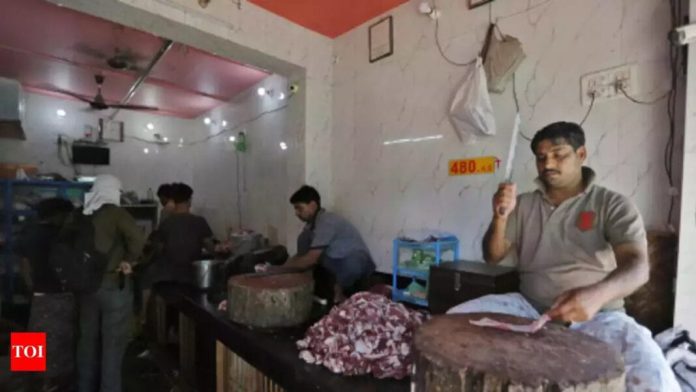The Varanasi Municipal Corporation (VMC) has initiated plans to widen Nai Sarak, a crucial stretch connecting Dal Mandi Chowk to the Kashi Vishwanath Temple. This development, aimed at easing traffic congestion, is set to impact nearly 10,000 shops and structures, all of which belong to Muslim proprietors, raising concerns about economic and social repercussions, reports The Hindu.
Criminal complaints have already been lodged against 12 meat shop owners in the area, with 26 others receiving notices to shut down operations. The VMC cites a 2024 resolution prohibiting the sale of meat within a two-kilometer radius of the Kashi Vishwanath Temple as the basis for its actions.
According to Syed Mohammed Yasin, secretary of Gyanvapi Masjid Management Committee, the demolition plan will disproportionately affect the local Muslim community.
“The loss of nearly 10,000 shops and some houses will deal a severe economic blow to Muslims in the area,” Yasin said.
He urged the government to implement a proper rehabilitation plan, including alternative locations for displaced shopkeepers and homeowners, before initiating demolition.
This is not the first instance of largescale demolition for urban development in Uttar Pradesh. In recent years, the VMC widened roads between Kashi Vishwanath Temple and Dashashamedh Ghat, despite opposition from heritage conservationists. Similarly, in Ayodhya, the state government demolished numerous shops, homes, and religious structures to improve traffic flow, leading to public discontent and political consequences.
Political analysts attribute the BJP’s loss of the Ayodhya Lok Sabha seat to public anger over these demolitions. The state government also postponed by-elections for the Milkipur assembly seat, reflecting the sensitivity of such projects.
The crackdown on meat shops stems from VMC’s January 2024 resolution to prohibit meat sales near the temple to respect the religious sentiments of pilgrims. Veterinary officer Dr. Santosh Pal, in his complaint, stated that repeated notices were issued to meat shop owners in February and December 2024. Despite this, the shopkeepers allegedly refused compliance, prompting FIRs under Sections 223 and 325 of the Bharatiya Nyaya Sanhita (BNS).
The VMC also cited unsanitary conditions and violations of the Food Safety and Standards Authority of India (FSSAI) regulations as reasons for action. However, shopkeepers claimed that VMC officials deliberately avoided renewing their licences for the past four years, leaving them vulnerable to legal action.
Yasin criticised the meat sellers for failing to respond proactively to the VMC resolution and legal notices. “Had they sought legal advice earlier, the situation might have been different,” he remarked, urging the community to remain vigilant about administrative changes.




